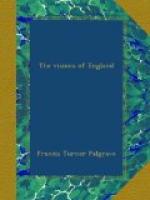When the kingdom; See Clarendon’s description of England during this period, ’enjoying the greatest calm and the fullest measure of felicity that any people in any age for so long time together have been blessed with.’
Three golden heads; Mary, the second child of Charles and Henrietta, was born Nov. 4, 1631: Elizabeth, Dec. 28, 1635: Anne, Mar. 17, 1637. The last two were feeble from infancy. Consumption soon showed itself in Anne, and her short life, passed at Richmond, closed in November, 1640. For her last words, we are indebted to Fuller, who adds: ’This done, the little lamb gave up the ghost.’
The affection and care of the royal parents is well attested. ’Their arrival,’ when visiting the nursery, ’was the signal of a general rejoicing.’
In the latter portion of this piece I have ventured, it will be seen, on an ideal treatment. The main facts, and the words of the dear child, are historical:—for the details I appeal to any mother who has suffered similar loss whether they could have been much otherwise.
Not seeing; See the Captive Child.
The frost; It is noticed that death, the Sarsar-wind of Southey’s Thalaba, often occurs at the turn between night and day, when the atmosphere is wont to be at the coldest.
AFTER CHALGROVE FIGHT
June 18: 1643
Flags crape-smother’d and
arms reversed,
With one sad volley lay him to rest:
Lay him to rest where he may not see
This England he loved like a lover accursed
By lawlessness masking as liberty,
By the despot in Freedom’s panoply drest:—
Bury him, ere he be made duplicity’s tool and
slave,
Where he cannot see the land that he could not save!
Bury him, bury him, bury him
With his face downward!
Chalgrove! Name of patriot
pain!
O’er thy fresh fields that summer pass’d
The brand of war’s red furnace blast,
Till heaven’s soft tears wash’d out
the blackening stain;—
Wash’d out and wept;—But could
not so restore
England’s gallant son:
Ere the fray was done
The stately head bow’d down; shatter’d;
his warfare o’er.
Bending to the saddle-bow
With leaden arm that idle hangs,
Faint with the lancing torture-pangs,
He drops the rein; he lets the battle go:—
There, where the wife of his first love he woo’d
Turning for retreat;—
Memories bitter-sweet
Through death’s fast-rising mist in youth’s
own light renew’d.
Then, as those who drown,
perchance,
And all their years, a waking dream,
Flash pictured by in lightning gleam,
His childhood home appears, the mother’s
glance,
The hearth-side smile; the fragrance of the fields:
—Now, war’s iron knell
Wakes the hounds of hell,
Whilst o’er the realm her scourge the rushing
Fury wields!
Doth he now the day lament
When those who stemm’d despotic might
O’erstrode the bounds of law and right,
And through the land the torch of ruin sent?
Or that great rival statesman as he stood
Lion-faced and grim,
Hath he sight of him,
Strafford—the meteor-axe—the
fateful Hill of Blood?




